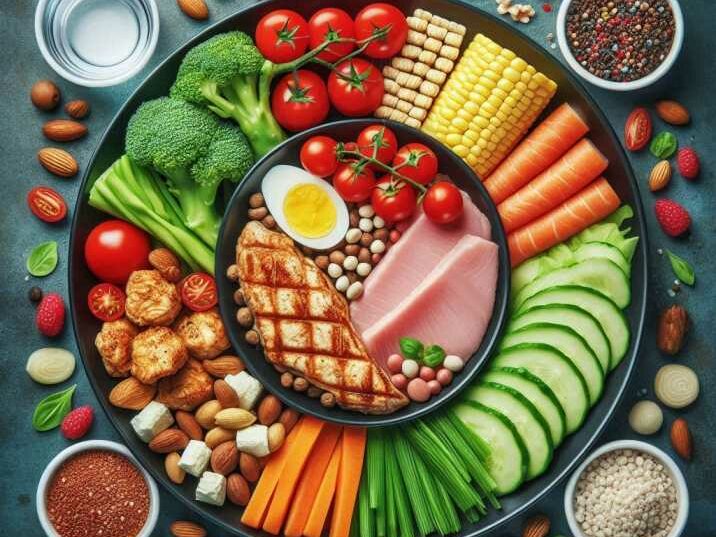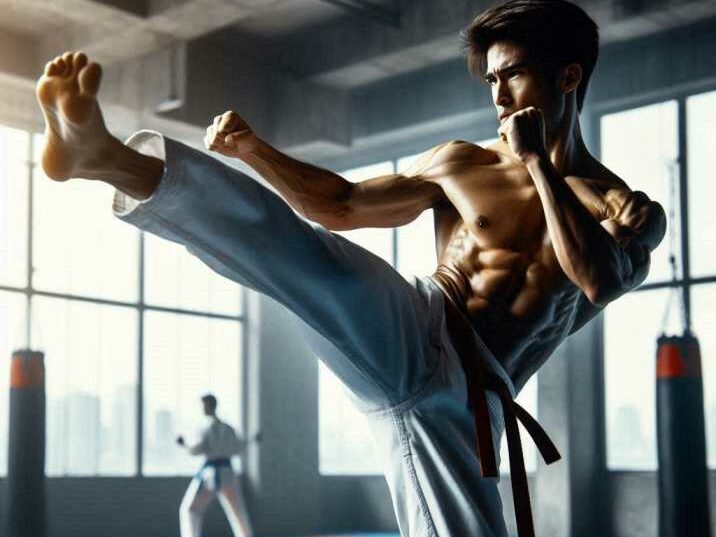Introduction:
Table of Contents
In the world of martial arts, discipline, focus, and strength are paramount. For young martial artists, ensuring optimal nutrition is essential for achieving peak performance and reaching their full potential. Among the various nutrients that play a crucial role in their diet, protein stands out as a powerhouse. Let’s delve into understanding the significance of protein for young martial artists and how it fuels their journey to success.

Importance of Protein for Young Martial Artists:
1. Building Blocks of Strength:
Protein, often referred to as the “building blocks” of the body, is essential for the growth and repair of muscles. When young martial artists engage in rigorous training sessions, their muscles undergo stress and micro-tears. Protein aids in repairing these muscles, making them stronger and more resilient.
Muscle growth and repair are essential components of strength development in martial arts. When young martial artists train, especially during intense sessions involving techniques like striking, grappling, or conditioning drills, their muscles experience strain and microscopic damage.This process, known as muscle hypertrophy, occurs when the body repairs these micro-tears in the muscle fibers, leading to increased muscle size and strength over time.
Protein provides the necessary amino acids for this repair process, facilitating muscle growth and recovery.
Protein supports as the foundation for muscle growth and repair, crucial for enhancing strength and endurance in martial artists.
2. Fuel for Performance:
During intense training sessions or competitions, the body requires energy to sustain performance. Protein, along with carbohydrates and fats, serves as a primary source of energy for the muscles. Unlike carbohydrates, which provide quick energy bursts, protein offers sustained energy, keeping young martial artists energized throughout their training sessions.
Protein supports a vital role in fueling the muscles during prolonged physical activity. When young martial artists engage in high-intensity training, their muscles require a constant supply of energy to maintain performance levels. While carbohydrates are the body’s preferred source of energy, protein serves as a valuable secondary fuel source, especially during longer training sessions or endurance-based activities. Protein-rich foods provide a sustained release of energy, helping young martial artists sustain their efforts and perform at their best.
Protein supports long-lasting energy, supporting sustained performance during martial arts training and competitions.
3. Enhancing Recovery:
Recovery is an integral part of any athlete’s routine, including young martial artists. Proper recovery allows the body to repair muscles, reduce fatigue, and prevent injuries. Protein plays a crucial role in the recovery process by facilitating muscle repair and replenishment.
After intense training sessions, the body enters a state of repair and recovery, where damaged muscle fibers are repaired and strengthened. Protein is essential during this phase, as it provides the amino acids necessary for muscle protein synthesis—the process by which new muscle proteins are created.
Adequate protein intake post-workout ensures that the body has the building blocks it needs to repair and rebuild muscle tissue, leading to faster recovery and reduced muscle soreness. Additionally, protein consumption post-exercise helps replenish glycogen stores, the primary energy source for muscles, aiding in overall recovery and performance readiness for the next training session.
Adequate Protein supports accelerates muscle recovery, minimizing downtime and maximizing training effectiveness.
4. Supporting Growth and Development:
For young martial artists, who are still in the stages of growth and development, protein is particularly important. It provides the necessary amino acids needed for cellular growth, tissue repair, and hormone production. Additionally, protein supports the development of strong bones and healthy immune function.
The adolescent years are a critical period of growth and development, both physically and mentally. Protein plays a vital role during this stage, as it provides the essential building blocks for cellular growth and repair. Amino acids, the building blocks of protein, are necessary for the synthesis of new cells, tissues, and organs, supporting overall growth and development in young martial artists. Additionally, protein is involved in the production of hormones, enzymes, and neurotransmitters, which regulate various physiological processes in the body.
Adequate protein intake is essential for promoting optimal growth, maintaining healthy body composition, and supporting immune function, ensuring that young martial artists have the resilience and vitality needed to excel in their training and competitions.
Protein supports overall growth and development in young martial artists, contributing to their physical and immune health.
5. Maintaining Optimal Weight and Body Composition:
Maintaining a healthy weight and body composition is essential for martial artists, as it directly impacts agility, speed, and flexibility. Protein plays a crucial role in this aspect by promoting satiety, reducing cravings, and supporting muscle mass. By including protein-rich foods in their diet, young martial artists can achieve and maintain their desired weight and physique.
Achieving and maintaining an optimal weight and body composition is crucial for young martial artists, as it directly affects their performance and agility on the mat. Protein plays a key role in this regard, as it promotes satiety and helps regulate appetite, reducing the likelihood of overeating or consuming excess calories. Additionally, protein is essential for preserving and building lean muscle mass, which is vital for strength, power, and athleticism in martial arts.
Unlike carbohydrates and fats, which can be stored as body fat if consumed in excess, protein has a higher thermic effect, meaning that the body expends more energy digesting and metabolizing protein-rich foods. This can aid in weight management and fat loss efforts, helping young martial artists achieve their desired body composition while preserving muscle mass and strength.
Protein aids in weight management and body composition, helping young martial artists achieve their performance goals.
6. Cognitive Function and Mental Performance:
While physical strength and endurance are crucial for martial arts, cognitive function and mental acuity are equally important for success in training and competitions. Protein-rich foods contain amino acids that are essential for neurotransmitter synthesis, supporting cognitive function, focus, and mental clarity. By ensuring adequate protein intake, young martial artists can enhance their mental performance and maintain sharpness during training sessions and competitions.
Protein-rich foods support cognitive function and mental performance, enhancing focus and alertness during training and competitions.

7. Injury Prevention and Recovery:
Injuries are a common occurrence in martial arts, ranging from minor strains to more severe sprains or fractures. Proper nutrition, including adequate protein intake, plays a crucial role in injury prevention and recovery. Protein supports the repair and regeneration of injured tissues, speeds up the healing process, and strengthens connective tissues such as tendons and ligaments, reducing the risk of future injuries.
Protein supports injury prevention and recovery by facilitating tissue repair, strengthening connective tissues, and promoting bone health.
8. Immune System Support:
A robust immune system is essential for young martial artists to stay healthy, consistent in their training, and perform at their best. Protein plays a crucial role in immune function by supporting the production of immune cells and antibodies, enhancing the body’s ability to fight off infections and illnesses.
Protein supports immune system function, helping young martial artists stay healthy and resilient against infections and illnesses.
9. Hormonal Regulation and Growth Hormone Release:
Protein intake can influence hormonal regulation in the body, including the release of growth hormone (GH), which plays a key role in muscle growth, repair, and recovery. Consuming protein-rich meals or snacks, particularly after exercise, can stimulate the release of GH, enhancing muscle protein synthesis and promoting muscle development in young martial artists.
Protein supports stimulates growth hormone release, enhancing muscle growth, repair, and fat metabolism in young martial artists.
Tips for Optimizing Protein Intake:
- Prioritize Lean Protein Sources: Encourage young martial artists to include lean protein sources such as chicken, turkey, fish, tofu, and legumes in their meals.
- Distribute Protein Intake Throughout the Day: Instead of consuming large amounts of protein in one sitting, advise them to spread their protein intake evenly across meals and snacks.
- Combine Protein with Carbohydrates: Pairing protein with carbohydrates post-workout can enhance muscle recovery and replenish glycogen stores.
- Stay Hydrated: Adequate hydration is essential for protein synthesis and muscle recovery. Encourage young martial artists to drink plenty of water throughout the day.
- Supplement Wisely: While whole foods should be the primary source of protein, protein supplements can be beneficial for convenience. However, encourage moderation and advise consulting with a healthcare professional before incorporating supplements.
Table of Information about Protein for Young Martial Artists:
| Protein-Rich Foods | Protein Content (per 100g) |
|---|---|
| Chicken Breast | 31g |
| Salmon | 25g |
| Greek Yogurt | 10g |
| Tofu | 8g |
| Lentils | 9g |
| Eggs | 6g |
| Quinoa | 4g |
Conclusion:
In conclusion, the significance of protein for young martial artists. protein plays a pivotal role in the diet of young martial artists, offering a multitude of benefits ranging from muscle growth and recovery to sustained energy and overall health. By prioritizing protein-rich foods and adopting smart dietary strategies, young martial artists can optimize their performance, enhance their strength and agility, and embark on a path to success in their martial arts journey.
FAQs (Frequently Asked Questions):
- How much protein does a young martial artist need daily?
- A young martial artist should aim to consume approximately 1.2 to 2 grams of protein per kilogram of body weight per day, depending on their training intensity and goals.
- Can too much protein be harmful to young martial artists?
- While protein is essential for muscle growth and recovery, excessive protein intake can strain the kidneys and may lead to dehydration. It’s important for young martial artists to maintain a balanced diet and avoid excessive protein supplementation.
- Are plant-based protein sources sufficient for young martial artists?
- Yes, plant-based protein sources such as tofu, lentils, beans, and quinoa can provide adequate protein for young martial artists. Combining different plant-based proteins throughout the day can ensure they receive all essential amino acids.
- When is the best time to consume protein for muscle recovery?
- Consuming protein-rich foods or supplements within 30 minutes to an hour after a workout can optimize muscle recovery and replenish glycogen stores. This post-workout window is often referred to as the “anabolic window.”
- Are protein shakes necessary for young martial artists?
- While protein shakes can be convenient for meeting daily protein requirements, they are not essential if young martial artists are able to obtain sufficient protein from whole foods. Whole foods offer additional nutrients and benefits beyond just protein supplementation.


